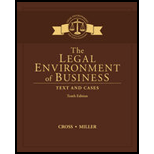
Case summary: Company A contracted with N for installation of rack system. Both parties were dissatisfied with the result and N filed a suit against A. The court applying the common law principle ruled in favor of N. A appealed to this decision contending that the lower court should have applied the UCC.
To find: The application of common law principles and UCC in cases involving goods and services.
Case summary: Company A contracted with N for installation of rack system. Both parties were dissatisfied with the result and N filed a suit against A. The court applying the common law principle ruled in favor of N. A appealed to this decision contending that the lower court should have applied the UCC.
To find: The decision of appellate court in favor of applying UCC.
Trending nowThis is a popular solution!

Chapter 14 Solutions
Bundle: The Legal Environment Of Business: Text And Cases, 10th + Mindtap Business Law, 1 Term (6 Months) Printed Access Card
- I am trying to find the accurate solution to this general accounting problem with appropriate explanations.arrow_forwardGeneral accounting questionarrow_forwardOn January 1, 2022, Hoda Corp. sells a piece of equipment for $31,000. The equipment was originally purchased on January 1, 2020, for $56,000. The equipment was estimated to have a useful life of 4 years and a residual value of $0. Hoda uses straight-line depreciation. How will Hoda record this transaction?arrow_forward
- On average, FurniStyle Ltd. is able to sell its inventory in 30 days. The firm takes 90 days on average to pay for its purchases. On the other hand, its average customer pays with a credit card, which allows the firm to collect its receivables in 6 days. What is the length of the operating cycle?arrow_forwardAccounting questionsarrow_forwardWhich of the following is not an investment grade credit rating?* BB+ BBB+ BBB BBB-arrow_forward
 BUSN 11 Introduction to Business Student EditionBusinessISBN:9781337407137Author:KellyPublisher:Cengage Learning
BUSN 11 Introduction to Business Student EditionBusinessISBN:9781337407137Author:KellyPublisher:Cengage Learning Essentials of Business Communication (MindTap Cou...BusinessISBN:9781337386494Author:Mary Ellen Guffey, Dana LoewyPublisher:Cengage Learning
Essentials of Business Communication (MindTap Cou...BusinessISBN:9781337386494Author:Mary Ellen Guffey, Dana LoewyPublisher:Cengage Learning Accounting Information Systems (14th Edition)BusinessISBN:9780134474021Author:Marshall B. Romney, Paul J. SteinbartPublisher:PEARSON
Accounting Information Systems (14th Edition)BusinessISBN:9780134474021Author:Marshall B. Romney, Paul J. SteinbartPublisher:PEARSON
 International Business: Competing in the Global M...BusinessISBN:9781259929441Author:Charles W. L. Hill Dr, G. Tomas M. HultPublisher:McGraw-Hill Education
International Business: Competing in the Global M...BusinessISBN:9781259929441Author:Charles W. L. Hill Dr, G. Tomas M. HultPublisher:McGraw-Hill Education





